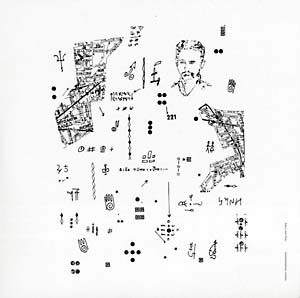BRAU, JEAN-LOUIS - Instrumentations Verbales
Pickup available at 1367 Greene Ave
Usually ready in 2-4 days
After releasing the first LPs ever published by Isidore Isou, Gil J Wolman, Hidlgo&Marchettis ZAJ... here is another historical premiere, or the first LP ever issued by French pre-situationist Jean-Louis Brau. Jean-Louis Brau (1930-1985) at the age of 20 joined along with Gil J Wolman, Isidore Isous Lettrist group, creating in this context (the same of Wolmans m_ɬ©gapneums, Dufr_ɬ™nes crirythmes, Lema_ɬÆtres hyperphonies and Isous po_ɬ®mes ciselants) what he called instrumentations verbales. In 1952 he recorded on a lathe the soundtrack to the unfinished film La barque de la vie courante (the first ever recording of experimental poetry). In the same year, with Debord, Berna and Wolman, he gave birth to the Internationale Lettriste, from which he was eventually rejected for his military deviation. After the Indochina war (where he ran a brothel and traded opium), Brau joined the French Army in Algeria, between 1956 and 1958. In 1963, back in Paris, Brau gave birth to a Deuxi_ɬ®me Internationale Lettriste together with Wolman and Dufr_ɬ™ne. He also designed an astonishing m_ɬ©tagraphic roman: No More. He approached everything in an explosive way, creating a body of work which is discontinuous, small and incomplete, in which he sometimes achieved some major results: for example with his sound poetry, as demonstrated by Turn back nightingale (1972), in which Brau makes references to Fran_ɬßois Dufr_ɬ™ne, on a background of disarticulated drums and pre-punk saturations. Also included on this one-sided LP are El_ɬ©gie El_ɬ©mentaire and Ataloche Roche, both recorded in 1961 during Isidore Isous conference at the Mus_ɬ©e dArt Moderne in Paris, as well as Instrumentation Verbale and Cantate pour linterdiction de Mandrake, both recorded in 1963 and first published in Po_ɬ©sie Physique, book with 3 singles (Brau, Dufr_ɬ™ne, Wolman), Ach_ɬ®le, in 1965. Edition limited to 350 copies reproducing a page from No More on the front sleeve, as well as an essay by Frederic Acquaviva. - Alga Marghen.


